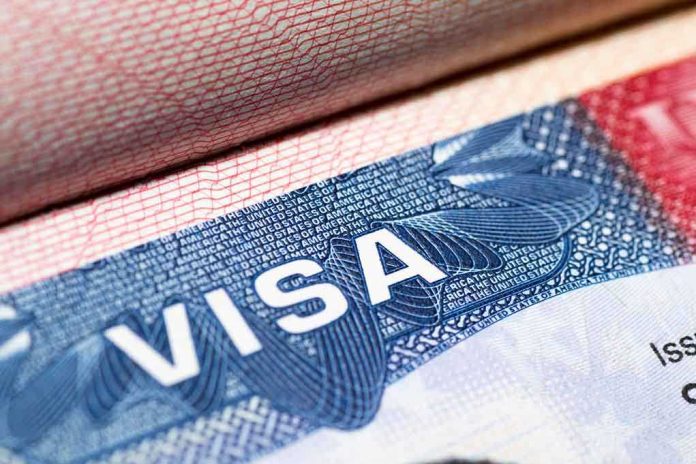
The Trump administration just stripped visa privileges from over 50 Mexican politicians and government officials, marking the most aggressive diplomatic assault on Mexico’s political establishment in decades over alleged cartel connections.
Story Highlights
- US revoked visas of more than 50 Mexican politicians and officials for alleged drug trafficking and corruption links
- Targets include state governors, ruling party members, and allies of President López Obrador
- Baja California Governor Marina del Pilar Ávila confirms her visa cancellation, claims she’s “collateral damage”
- Action represents unprecedented scale of US intervention in Mexican political networks
Trump’s Nuclear Option Against Mexican Corruption
The visa revocations represent a dramatic escalation in America’s war against cartel influence, targeting the highest echelons of Mexican power. Unlike previous actions against mid-level officials or businesspeople, this sweep encompasses state governors, members of President Claudia Sheinbaum’s ruling Morena party, and prominent political figures who formerly enjoyed unrestricted access to the United States.
The timing signals a fundamental shift in strategy. Rather than targeting cartel foot soldiers or street-level corruption, American authorities are dismantling the political infrastructure that enables organized crime to flourish. This approach acknowledges an uncomfortable truth: defeating cartels requires confronting the politicians who provide them protection and legitimacy.
Political Casualties Mount Across Mexico
Governor Marina del Pilar Ávila of Baja California publicly confirmed her visa cancellation, describing herself as collateral damage in investigations targeting her husband and brother-in-law for alleged fuel smuggling. Her candid admission reveals how deeply corruption allegations penetrate Mexican political families, extending beyond individual officeholders to their immediate circles.
The U.S. State Department has revoked the visas of at least 50 politicians and government officials in Mexico over the last few months, as part of the Trump Administration’s ongoing crackdown on Mexican officials and the elite who are believed to have linked to the Cartels,… pic.twitter.com/Tv8mjMjC4a
— OSINTdefender (@sentdefender) October 14, 2025
Reports indicate other state governors face similar restrictions, though many deny involvement or contest the allegations. The secrecy surrounding visa decisions creates a climate of uncertainty, with politicians uncertain whether they’ll discover travel restrictions only when attempting to cross the border. This psychological pressure may prove as effective as formal sanctions in disrupting cartel-political networks.
Diplomatic Shockwaves and Sovereignty Concerns
President Sheinbaum’s government requested clarification from Washington but received the standard response that visa matters remain confidential. This bureaucratic stonewalling intensifies diplomatic tensions, as Mexico cannot effectively defend officials without understanding specific allegations against them. The situation forces Sheinbaum into an impossible position: defending potentially corrupt allies or appearing subservient to American pressure.
Anonymous US officials confirm Treasury Department sanctions may follow visa revocations, suggesting this represents only the opening salvo in a broader campaign. Financial restrictions could prove far more damaging than travel limitations, potentially freezing assets and restricting business relationships across international borders.
The Cartel-Political Complex Under Attack
These actions acknowledge what investigators have long understood: cartels operate as quasi-governmental entities requiring political cooperation to function. Fuel smuggling, money laundering, and drug trafficking demand official complicity at multiple levels. By targeting politicians rather than just criminals, American authorities attack the symbiotic relationship that makes cartels virtually untouchable within Mexico.
The unprecedented scale suggests extensive intelligence gathering, likely involving financial surveillance, communications intercepts, and cooperation from arrested cartel figures like Ovidio Guzmán López. This comprehensive approach indicates years of preparation, not reactive policy-making. The implications extend beyond individual cases to threaten entire political networks built around cartel relationships.
Sources:
Immigration Policy Tracking Project







